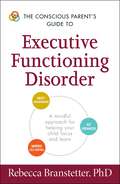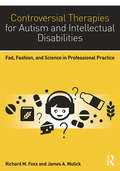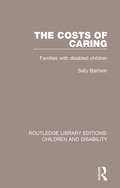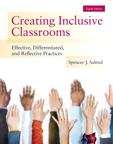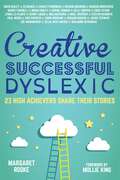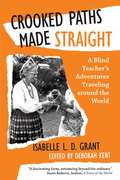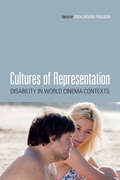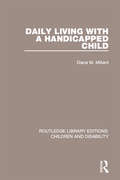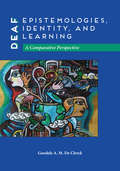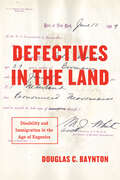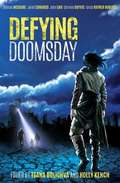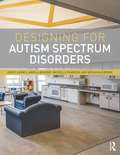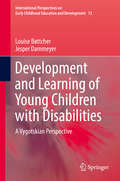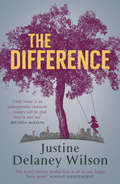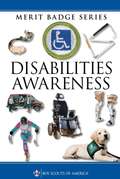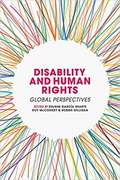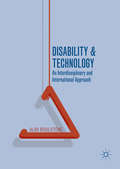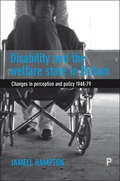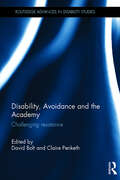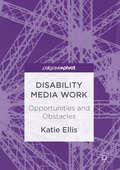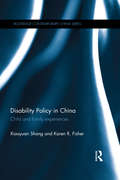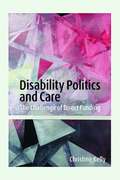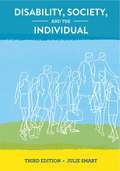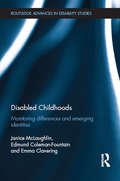- Table View
- List View
The Conscious Parent's Guide to Executive Functioning Disorder: A Mindful Approach for Helping Your child Focus and Learn
by Rebecca BranstetterHelp your child feel confident and capable!If your child has been given a diagnosis of executive functioning disorder, you may be feeling overwhelmed and unsure of what to do next. You want your child to be able to master certain basic skills, such as being organized, staying focused, and controlling impulses and emotions. But what if your child is having trouble with one or all of these skills? With The Conscious Parent's Guide to Executive Functioning Disorder, you'll learn how to take a relationship-centered approach to parenting as you help improve your child's executive functioning skills:Task initiationResponse inhibitionFocusTime managementWorking memoryFlexibilitySelf-regulationCompleting tasksOrganizationConscious parenting is about being present with your children and taking the time to understand how to help them flourish. With the strategies and advice in this guide, you and your child will build sustainable bonds, develop positive behaviors, and improve executive functioning skills for life. And you'll find that conscious parenting helps create a calm and mindful atmosphere for the whole family, while helping your child feel competent, successful, and healthy.
Controversial Therapies for Autism and Intellectual Disabilities: Fad, Fashion, and Science in Professional Practice
by James A. Mulick Richard M. FoxxOne of the largest and most complex human services systems in history has evolved to address the needs of people with autism and intellectual disabilities, yet important questions remain for many professionals, administrators, and parents. What approaches to early intervention, education, treatment, therapy, and remediation really help those with autism and other intellectual disabilities improve their functioning and adaptation? Alternatively, what approaches represent wastes of time, effort, and resources? <p><p>Controversial Therapies for Autism and Intellectual Disabilities, 2nd Edition brings together leading behavioral scientists and practitioners to shed much-needed light on the major controversies surrounding these questions. Expert authors review the origins, perpetuation, and resistance to scrutiny of questionable practices, and offer a clear rationale for appraising the quality of various services. <p><p>The second edition of Controversial Therapies for Autism and Intellectual Disabilities has been fully revised and updated and includes entirely new chapters on psychology fads, why applied behavioral analysis is not a fad, rapid prompting, relationship therapies, the gluten-free, casein-free diet, evidence based practices, state government regulation of behavioral treatment, teaching ethics, and a parents' primer for autism treatments.
The Costs of Caring: Families with Disabled Children (Routledge Library Editions: Children and Disability #4)
by Sally BaldwinFirst published in 1985, this book considers the financial consequences of parents and other relatives caring for severely disabled children at home. At the time of publication little reliable information was available on the costs incurred by ‘informal carers’, which this book set to rectify. The volume interweaves hard statistical material about money with the detailed personal responses of parents. It examines the claim that disablement in a child reduces parents’ earnings while simultaneously creating an extra expense. The author compares the incomes and expenditure patterns of more than 500 families with disabled children and 700 control families of the time showing that the financial effects of disablement in a child can be far-reaching and pervasive. This book discusses contemporary policy implications of these findings in a chapter dealing with the rational for compensating families with disabled children, and in the final chapter. Although the book was original published in 1985, it references issues that are still important today and, whilst its main concern is families with disabled children, it will also be useful to anyone caring for other kinds of dependent people, such as the elderly.
Creating Inclusive Classrooms: Effective, Differentiated, and Reflective Practices (Eighth Edition)
by Spencer J. SalendCreating effective inclusive classrooms means understanding the role of education in a democratic society and federal legislation, as well as aligning your instruction with national and state standards. But the practical, up-to-date and digital eighth edition of Creating Inclusive Classrooms: Effective, Differentiated and Reflective Practices recognizes that it means more than that. It means using current research related to effective practices in curriculum, instruction, technology, assessment, classroom management, collaboration, and family involvement to foster the learning of all of your students. It means being an evidence-based and reflective educator who continually collects and analyzes evidence to document and enhance the effectiveness of your professional practices, and who thinks critically about your own values and beliefs so you can better differentiate your instruction and promote the learning of all of your students. It means being sensitive and responsive to diversity and individual differences, and collaborating with your students and their families and other educators to create the most successful educational experience for all of your students.
Creative, Successful, Dyslexic: 23 High Achievers Share Their Stories
by Kelly Hoppen Mbe Zelda West-Meads Sir Richard Branson Sophie Conran Lynda La Cbe Margaret Rooke Theo Paphitis Zoe Wanamaker Cbe Sir Jackie Obe David Bailey Cbe Steven Naismith Paul Nixon Darcey Bussell Cbe Brian Conley Nigel Mccrery Ed Baines Meg Mathews Benjamin Zephaniah Mollie King Chris Robshaw Eddie Izzard Marcus Brigstocke Charley Boorman Kenny Logan Richard Rogers23 very well-known people from the arts, sport, and business worlds talk about how dyslexia affected their childhood, how they were able to overcome the challenges and use the special strengths of dyslexia to achieve great success in adulthood. Darcey Bussell CBE, Eddie Izzard, Sir Richard Branson, Meg Mathews, Zoe Wanamaker CBE, Richard Rogers, Benjamin Zephaniah, Steven Naismith, Lynda La Plante CBE, Sir Jackie Stewart OBE, Sophie Conran and others share their stories, and their advice. All reveal the enormous difficulties they faced, the strength required to overcome them, the crucial importance of adult support, and how `the different way the brain is wired' in dyslexia has enabled them to see something different in the world and to use their creativity in an exceptional way. They talk about `thinking sideways', and the ability to look at a bigger picture, the often strong visual strength, and the ability to listen, and to grasp simplicity where other people see only complexity. They also talk about how dyslexia continues to challenge them, and the ways they have found to work around this. An introduction, and final section that includes practical information about dyslexia, are written with the support of Dyslexia Action, and a percentage of profit from the book is donated to Dyslexia Action. The book will be essential reading for teachers and other professionals, and for families affected by dyslexia, and inspirational for people with dyslexia.
Crooked Paths Made Straight: A Blind Teacher's Adventures Traveling Around The World
by Isabelle L. D. Grant Deborah Kent<P>In 1959, two years before she retired from teaching, Dr. Isabelle Grant set off on a yearlong journey around the world with Oscar, her long white cane, in her hand. She had been totally blind for the past twelve years. <P>In Crooked Paths Made Straight, she shares the story of her journey during which she visited twenty-three countries from Great Britain to Fiji. In Karachi, she traveled the streets by rickshaw and struggled to master the Urdu language. In India, she explored the Taj Mahal, and in Burma she slept in a room where lizards raced up and down the walls. <P>At a time when both women and blind people were generally seen as too helpless for solo travel, Grant fearlessly defied conventions. A dedicated teacher with a lifelong commitment to learning, her mission was to learn all she could about education in the countries she visited, in particular the education provided to blind children. <P>Completed in 1965, Crooked Paths Made Straight recounts Grant's journey, a story of dreams deferred that did not shrivel but sprang to life again and again.
Cultures of Representation: Disability in World Cinema Contexts (Toronto Iberic Ser.)
by Benjamin FraserCultures of Representation is the first book to explore the cinematic portrayal of disability in films from across the globe. Contributors explore classic and recent works from Belgium, France, Germany, India, Italy, Iran, Japan, Korea, Mexico, Netherlands, Russia, Senegal, and Spain, along with a pair of globally resonant Anglophone films. Anchored by David T. Mitchell and Sharon L. Snyder's coauthored essay on global disability-film festivals, the volume's content spans from 1950 to today, addressing socially disabling forces rendered visible in the representation of physical, developmental, cognitive, and psychiatric disabilities. Essays emphasize well-known global figures, directors, and industries – from Temple Grandin to Pedro Almodóvar, from Akira Kurosawa to Bollywood – while also shining a light on films from less frequently studied cultural locations such as those portrayed in the Iranian and Korean New Waves. Whether covering postwar Italy, postcolonial Senegal, or twenty-first century Russia, the essays in this volume will appeal to scholars, undergraduates, and general readers alike.
Daily Living with a Handicapped Child (Routledge Library Editions: Children and Disability #11)
by Diana M. MillardFirst published in 1984, this book focuses on the support and reassurance needed by parents of children with handicaps. It provides a practical guide in relation to daily care and is equally as relevant to professionals, therapists, teachers, doctors and psychologists who must advise parents. Written by an Occupational Therapist, the book highlights the need to make such children as independent as possible and gives advice on care of a special baby, modifications to the home environment, the needs of a child with a physical handicap, problems of educational handicap, and the place of a child in the family and community.
Deaf Epistemologies, Identity, and Learning: A Comparative Perspective
by Goedele A. De ClerckGoedele A. M. De Clerck presents cross-cultural comparative research that examines and documents where deaf flourishing occurs and how it can be advanced. She spotlights collective and dynamic resources of knowledge and learning; the coexistence of lived differences; social, linguistic, cultural, and psychological capital; and human potential and creativity. Deaf Epistemologies, Identity, and Learning argues for an inclusive approach to the intrinsic human diversity in society, education, and scholarship, and shows how emotions of hope, frustration, and humiliation contribute to the construction of identity and community. De Clerck also considers global to local dynamics in deaf identity, deaf culture, deaf education, and deaf empowerment. She presents empirical research through case studies of the emancipation processes for deaf people in Flanders (a region of Belgium), the United States (specifically, at Gallaudet University in Washington, DC), and the West African nation of Cameroon. These three settings illuminate different phases of emancipation in different contexts, and the research findings are integrated into a broader literature review and subjected to theoretical reflection. De Clerck’s anthropology of deaf flourishing draws from her critical application of the empowerment paradigm in settings of daily life, research, leadership, and community work, as she explores identity and well-being through an interdisciplinary lens. This work is centered around practices of signed storytelling and posits learning as the primary access and pathway to culture, identity, values, and change. Change driven by the learning process is considered an awakening—and through this awakening, the deaf community can gain hope, empowerment, and full citizenship. In this way, deaf people are allowed to shape their histories, and the result is the elevation of all aspects of deaf lives around the world.
Defectives in the Land: Disability and Immigration in the Age of Eugenics
by Douglas C. BayntonImmigration history has largely focused on the restriction of immigrants by race and ethnicity, overlooking disability as a crucial factor in the crafting of the image of the "undesirable immigrant." Defectives in the Land, Douglas C. Baynton's groundbreaking new look at immigration and disability, aims to change this. In the late nineteenth and early twentieth centuries, Baynton explains, immigration restriction in the United States was primarily intended to keep people with disabilities--known as "defectives"--out of the country. The list of those included is long: the deaf, blind, epileptic, and mobility impaired; people with curved spines, hernias, flat or club feet, missing limbs, and short limbs; those unusually short or tall; people with intellectual or psychiatric disabilities; intersexuals; men of "poor physique" and men diagnosed with "feminism." Not only were disabled individuals excluded, but particular races and nationalities were also identified as undesirable based on their supposed susceptibility to mental, moral, and physical defects. In this transformative book, Baynton argues that early immigration laws were a cohesive whole--a decades-long effort to find an effective method of excluding people considered to be defective. This effort was one aspect of a national culture that was increasingly fixated on competition and efficiency, anxious about physical appearance and difference, and haunted by a fear of hereditary defect and the degeneration of the American race.
Defying Doomsday
by Tsana Dolichva Holly KenchTeens form an all-girl band in the face of an impending comet. A woman faces giant spiders to collect silk and protect her family. New friends take their radio show on the road in search of plague survivors. A man seeks love in a fading world. How would you survive the apocalypse? Defying Doomsday is an anthology of apocalypse fiction featuring disabled and chronically ill protagonists, proving it’s not always the “fittest” who survive - it’s the most tenacious, stubborn, enduring and innovative characters who have the best chance of adapting when everything is lost. In stories of fear, hope and survival, this anthology gives new perspectives on the end of the world, from authors Corinne Duyvis, Janet Edwards, Seanan McGuire, Tansy Rayner Roberts, Stephanie Gunn, Elinor Caiman Sands, Rivqa Rafael, Bogi Takács, John Chu, Maree Kimberley, Octavia Cade, Lauren E Mitchell, Thoraiya Dyer, Samantha Rich, and K Evangelista.
Designing for Autism Spectrum Disorders
by Angela Bourne Michelle Pearson Kristi Gaines Mesha KleibrinkWinner of the 2017 IDEC Book Award, 2017 EDRA Great Places Award (Book Category), 2017 American Society of Interior Designers Joel Polsky Prize and the 2016 International Interior Design Association TXOK Research Award Designing for Autism Spectrum Disorders explains the influence of the natural and man-made environment on individuals with autism spectrum disorders (ASD) and other forms of intellectual/developmental disabilities (IDD). Drawing on the latest research in the fields of environmental psychology and education, the authors show you how architecture and interior spaces can positively influence individuals with neurodiversities by modifying factors such as color, lighting, space organization, textures, acoustics, and ventilation. Now you can design homes, therapeutic environments, work environments, and outdoor spaces to encourage growth and learning for the projected 500,000 children with ASD (in the United States alone) who are expected to reach adulthood by 2024. Topics discussed include:-Environmental design theories-Symptoms of ASD-Sensory processing deficits -Design needs of individuals on the spectrum at all ages-Design methods and solutions for spaces, including residential, learning, work, and therapeutic environments encompassing a wide range of budgets-Designing for self-actualization, well-being, and a high quality of life for the duration of an individual's life-Avenues for healthy living and aging in place-Biophilic design-Environmental impact on well-being -Strategies to promote active living as an integral part of the welfare focus.
Development and Learning of Young Children with Disabilities
by Louise Boettcher Jesper DammeyerThis book introduces current theories and research on disability, and builds on the premise that disability has to be understood from the dialectical dynamics of biology, psychology, and culture over time. Based on the newest empirical research on children with disabilities, the book overcomes the limitations of the medical and social models of disability by arguing for a dialectical biopsychosocial model. The proposed model builds on Vygotsky's cultural-historical ideas of developmental incongruence, implying that the disability emerges from the misfit between individual abilities and the cultural-historical activity settings in which the child with impairments participates. The book is a theoretical contribution to an updated understanding of disability from a psychological and educational perspective. It focuses on the first years of the life of the child with impairment, and travels through infancy, toddler, preschool and early school age, to track the developmental trajectories of disability through the dialectical processes of cultural, social, individual, and biological processes. It discusses a number of themes that are relevant for the early development and support for children with various types and degrees of disability through the lens of Vygotsky's cultural-historical developmental theories. Some of the themes discussed are inclusion, mental health, communication, aids and family life.
The Difference
by Justine Delaney WilsonOn a January morning, Beth and Steve bring three-day-old Ismae home from the hospital. A little girl to complete their suburban family.Except Beth knows that Ismae is different. And that, as she gets older and stronger, her difference will become more obvious.As the future Beth imagined grows even more out of reach, the walls of their vast house close in on her, isolating her from Steve.Then she makes a terrible discovery ...Will Ismae's difference break her family apart? Or will Beth be able to see that it's the one thing that can save her?'Little Ismae is an unforgettable character ... readers will be glad they've met her'BELINDA McKEON 'A novel about one woman's quest for an authentic life. When extraordinary new baby Ismae turns Beth's world inside out, she begins to understand the fierce power of mother-love and,through her daughter, learns to know and trust herself. A moving, convincing story of courage and burgeoning hope' NUALA O'CONNOR, AUTHOR OF MISS EMILY
Disabilities Awareness (Merit Badge Series)
by Boy Scouts of America StaffBoy Scouts of America Merit Badge Series: Disabilities Awareness.
Disability and Human Rights: Global Perspectives
by Edurne García Iriarte Roy McConkey Robbie GilliganExperienced by more than one billion people worldwide, disability is increasingly recognised as a human rights issue internationally. Completely up to date, Disability and Human Rights draws on cutting edge international research and real life examples to explore the global dimension of disability and to critically review progress on the implementation of the United Nations Convention on the Rights of Persons with Disabilities. <P><P> This book provides readers with an in-depth exploration of disability across key areas of hu-man rights, including health, education, employment, accessibility and independent living. It demonstrates how these issues are integral to achieving full and equal participation of disa-bled people in human societies across the life cycle. The book analyses the impact of poverty, the importance of support and the relevance of culture and it maps out how to make disability rights a reality in the coming decades. <P><P> Chapters are enriched with a wide range of international case examples and questions for reflection to deepen readers' understanding of the material. Students and practitioners from a wide range of backgrounds, including disability studies, human rights, social work and social care will benefit from this much-needed new global perspective on disability.
Disability and Political Theory
by Barbara Arneil Nancy J. HirschmannThough disability scholarship has been robust in history, philosophy, English, and sociology for decades, political theory and political science more generally have been slow to catch up. This groundbreaking volume presents the first full-length book on political theory approaches to disability issues. Barbara Arneil and Nancy J. Hirschmann bring together some of the leading scholars in political theory to provide a historical analysis of disability through the works of canonical figures, ranging from Hobbes and Locke to Kant, Rawls and Arendt, as well as an analysis of disability in contemporary political theory, examining key concepts, such as freedom, power and justice. Disability and Political Theory introduces a new disciplinary framework to disability studies, and provides a comprehensive introduction to a new topic of political theory.
Disability and Technology
by Alan RoulstoneThis book brings together formally disparate literatures and debates on disability and technology in a way that captures the complex interplay between the two. Drawing on disability studies, technology studies and clinical studies, the book argues that interdisciplinary insights together provide a more nuanced and less stylized picture of the benefits and barriers in disability and technology. Drawing on a breadth of empirical studies from across the globe, a picture emerges of the complex and multi-directional interplay of technology and disability. Technology is neither inherently enabling or disabling but fundamentally shaped by the social dynamics that shape their design, use and impact.
Disability and the Welfare State in Britain: Changes in Perception and Policy 1948–79
by Jameel HamptonCreated during and after the Second World War, the British Welfare State seemed to promise welfare for all, but, in its original form, excluded millions of disabled people. This book examines attempts in the subsequent three decades to reverse this exclusion. It is the first to contextualise disability historically in the welfare state and under each government of the period. It looks at how disability policy and perceptions were slow to change as a welfare issue, which is very timely in today’s climate of austerity. It also provides the first major analysis of the Disablement Income Group, one of the most powerful pressure groups in the period and the 1972 Thalidomide campaign and its effect on the Heath government. Given the recent emergence of the history of disability in Britain as a major area of research, the book will be ideal for academics, students and activists seeking a better understanding of the topic.
Disability, Avoidance and the Academy: Challenging Resistance (Routledge Advances in Disability Studies)
by David Bolt Claire PenkethDisability is a widespread phenomenon, indeed a potentially universal one as life expectancies rise. Within the academic world, it has relevance for all disciplines yet is often dismissed as a niche market or someone else’s domain. This collection explores how academic avoidance of disability studies and disability theory is indicative of social prejudice and highlights, conversely, how the academy can and does engage with disability studies. This innovative book brings together work in the humanities and the social sciences, and draws on the riches of cultural diversity to challenge institutional and disciplinary avoidance. Divided into three parts, the first looks at how educational institutions and systems implicitly uphold double standards, which can result in negative experiences for staff and students who are disabled. The second part explores how disability studies informs and improves a number of academic disciplines, from social work to performance arts. The final part shows how more diverse cultural engagement offers a way forward for the academy, demonstrating ways in which we can make more explicit the interdisciplinary significance of disability studies – and, by extension, disability theory, activism, experience, and culture. Disability, Avoidance and the Academy: Challenging Resistance will interest students and scholars of disability studies, education studies and cultural studies.
Disability Media Work
by Katie EllisThis book interrogates trends in training and employment of people with disabilities in the media through an analysis of people with disabilities' self-representation in media employment. Improving disability representations in the media is vital to improving the social position of people with disability, and including people with lived experience of disability is integral to this process. While the media industry has changed significantly as a result of digital and participatory media, discriminatory attitudes around fear and pity continue to impact whether people with disability find work in the media. The book demonstrates no significant changes in attitudes towards employing disabled media workers since the 1990s when the last major research into this topic took place. By focusing on the employment of people with disability in media industries, Katie Ellis addresses a neglected area of media diversity, appealing to researchers in media and cultural studies as well as critical disability studies.
Disability Policy in China: Child and family experiences (Routledge Contemporary China Series)
by Xiaoyuan Shang Karen R. FisherWithout access to a public social welfare system in parts of China, some families face invidious decisions about the lives of their children with disabilities. In other places, children with disabilities can now expect to participate in their families and communities with the same aspirations as other children. Understanding how Chinese policy has changed in the places that have addressed these stark situations is vital for the rights of the children and their families who still struggle to find the support they need. This book examines family experiences of child disability policy in China, and is the first to compile research on this area. It applies a child disability rights framework in four domains – care and protection, economic security, development and participation – to investigate families’ experiences of the effectiveness of support to fulfil their children’s rights. Questioning how families experience the interrelationships between these rights, it also considers what the further implications of the policy are. It includes vivid case studies of families’ experiences, and combines these with national data to draw out the likely future policy directions to which the Chinese government has said it is committed. Bringing together a wealth of statistical and qualitative data on children with disabilities, this book will be of great interest to students and scholars of Chinese social welfare, social policy, society and children's studies, as well as policy-makers and NGOs alike.
Disability Politics and Care: The Challenge of Direct Funding
by Christine Kelly“We do not need care!” is a rallying cry for disability movements. It is informed by a recognition that a lack of choice over simple care decisions – like what to eat or what to wear – is a subtle yet pervasive form of violence endured by many disabled people. This book examines an independent living program to explore what happens when people with disabilities take control of their own care arrangements. The author documents responses by a wide range of stakeholders of this program and reflects on some of its broader social and political implications.
Disability, Society, and the Individual
by Julie SmartThis unique book provides a comprehensive examination of the disability experience. The content focuses on definitions of disability, societal response to people with disabilities, and the experience of disability from the perspectives of individuals with disability. It is organized around broad themes rather than disability categories. With an engaging writing style and extensive and completely updated references, Disability, Society, and the Individual-Third Edition prepares the reader to understand and be able to use complex, important, and new ideas surrounding disability -- its experience and social and cultural context. The text includes discussion questions, learning activities, suggested readings, and first-person accounts. PART I--Definitions of Disability PART II--Society and Disability PART III--The Individual and Disability
Disabled Childhoods: Monitoring Differences and Emerging Identities (Routledge Advances in Disability Studies)
by Janice McLaughlin Edmund Coleman-Fountain Emma ClaveringA crucial contemporary dynamic around children and young people in the Global North is the multiple ways that have emerged to monitor their development, behaviour and character. In particular disabled children or children with unusual developmental patterns can find themselves surrounded by multiple practices through which they are examined. This rich book draws on a wide range of qualitative research to look at how disabled children have been cared for, treated and categorised. Narrative and longitudinal interviews with children and their families, along with stories and images they have produced and notes from observations of different spaces in their lives – medical consultation rooms, cafes and leisure centres, homes, classrooms and playgrounds amongst others – all make a contribution. Bringing this wealth of empirical data together with conceptual ideas from disability studies, sociology of the body, childhood studies, symbolic interactionism and feminist critical theory, the authors explore the multiple ways in which monitoring occurs within childhood disability and its social effects. Their discussion includes examining the dynamics of differentiation via medicine, social interaction, and embodiment and the multiple actors – including children and young people themselves – involved. The book also investigates the practices that differentiate children into different categories and what this means for notions of normality, integration, belonging and citizenship. Scrutinising the multiple forms of monitoring around disabled children and the consequences they generate for how we think about childhood and what is ‘normal’, this volume sits at the intersection of disability studies and childhood studies.
